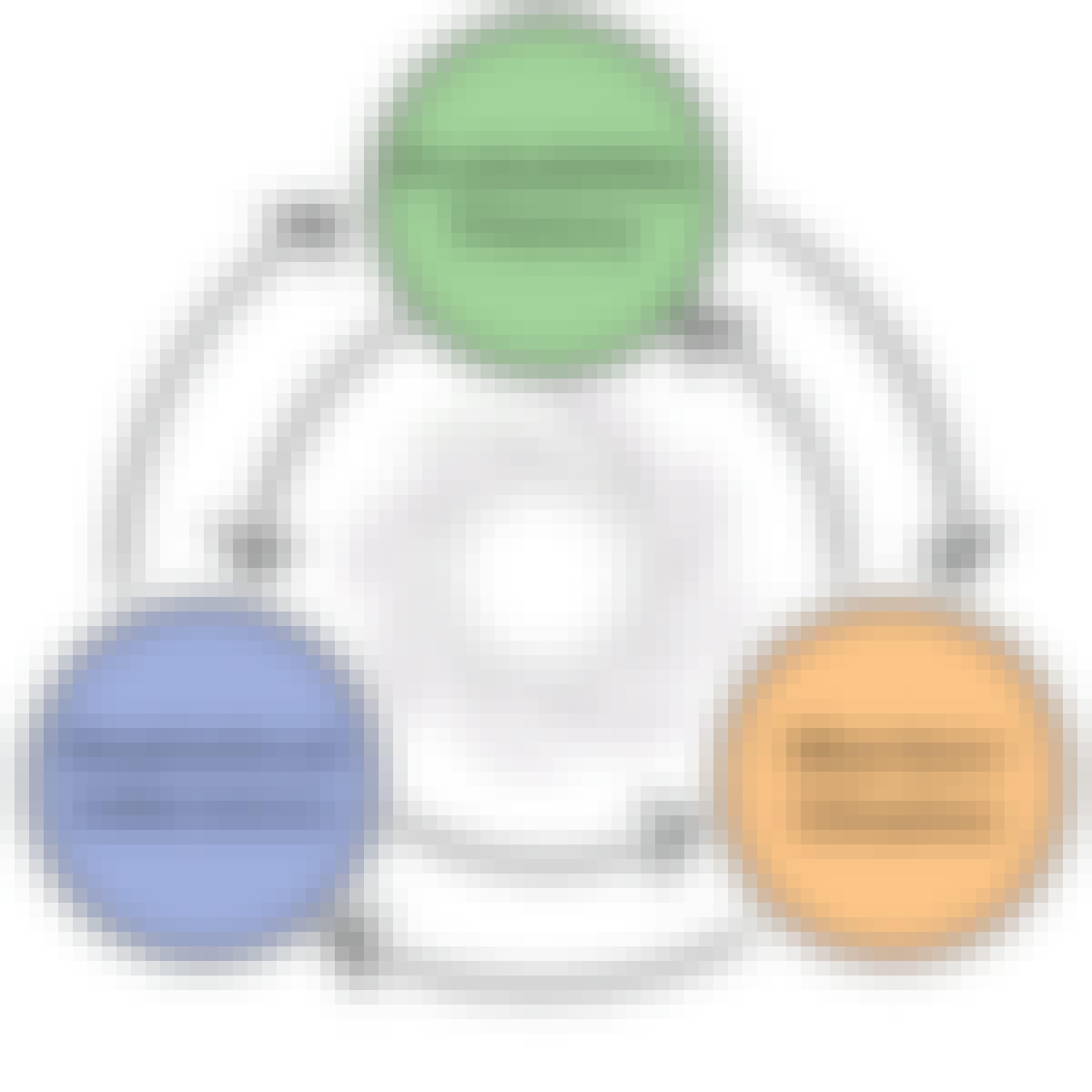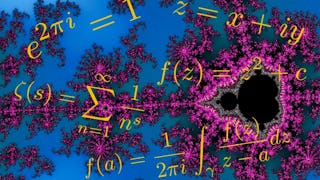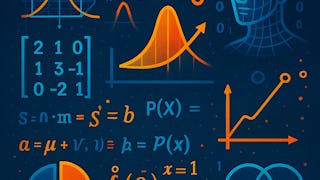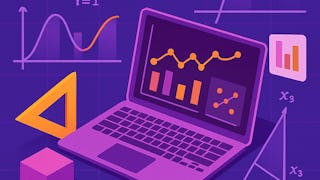Filter by
SubjectRequired
LanguageRequired
The language used throughout the course, in both instruction and assessments.
Learning ProductRequired
LevelRequired
DurationRequired
SkillsRequired
SubtitlesRequired
EducatorRequired
Explore the Functional Analysis Course Catalog
 Status: NewStatus: Free Trial
Status: NewStatus: Free TrialUniversity of Colorado Boulder
Skills you'll gain: Probability, Markov Model, Estimation, Probability & Statistics, Probability Distribution, Statistical Methods, Statistical Inference, Bayesian Statistics, Sampling (Statistics), Statistical Analysis, Mathematical Modeling, Statistics, Statistical Modeling, Data Analysis, Data Science, Descriptive Statistics, Machine Learning Algorithms, Artificial Intelligence, Generative AI
 Status: Preview
Status: PreviewWesleyan University
Skills you'll gain: Integral Calculus, Mathematical Theory & Analysis, Algebra, Advanced Mathematics, Geometry, Calculus, Trigonometry, Graphing
 Status: Preview
Status: PreviewLondon Business School
Skills you'll gain: Financial Statement Analysis, Financial Analysis, Financial Statements, Balance Sheet, Financial Reporting, Financial Modeling, Income Statement, Return On Investment, Accounting, Investments, Cash Flows, Asset Management
 Status: NewStatus: Free Trial
Status: NewStatus: Free TrialSkills you'll gain: Functional Design, Application Programming Interface (API)
 Status: NewStatus: Free Trial
Status: NewStatus: Free TrialBirla Institute of Technology & Science, Pilani
Skills you'll gain: Engineering Calculations, Data Analysis, Trigonometry, Engineering Analysis, Probability & Statistics, Computational Logic, Statistical Analysis, Linear Algebra, Logical Reasoning, Deductive Reasoning, Calculus, Analytics, Bayesian Statistics, Statistical Modeling, Artificial Intelligence and Machine Learning (AI/ML), Differential Equations, Statistical Inference, Theoretical Computer Science, Programming Principles, Descriptive Analytics
 Status: NewStatus: Free Trial
Status: NewStatus: Free TrialUniversity of Pittsburgh
Skills you'll gain: Statistical Analysis, NumPy, Probability Distribution, Matplotlib, Statistics, Pandas (Python Package), Data Science, Probability & Statistics, Probability, Statistical Modeling, Predictive Modeling, Data Analysis, Linear Algebra, Predictive Analytics, Statistical Methods, Mathematics and Mathematical Modeling, Applied Mathematics, Python Programming, Machine Learning, Logical Reasoning
What brings you to Coursera today?
 Status: Free Trial
Status: Free TrialÉcole Polytechnique Fédérale de Lausanne
Skills you'll gain: Scala Programming, Apache Spark, Apache Hadoop, User Interface (UI), Programming Principles, Big Data, Software Design, Data Structures, Software Design Patterns, Functional Design, Data Manipulation, Object Oriented Programming (OOP), Heat Maps, Data Visualization Software, Interactive Data Visualization, Computer Programming, Distributed Computing, Data Processing, Real Time Data, Performance Tuning
 Status: Free Trial
Status: Free TrialJohns Hopkins University
Skills you'll gain: Calculus, Applied Mathematics, Data Modeling, Estimation, Graphing, Mathematical Modeling, Algebra, Cost Estimation, Mathematical Software, Engineering Calculations, Linear Algebra, Trigonometry, Operations Research, Data Analysis, Derivatives, Mathematical Theory & Analysis, Geometry
 Status: Free Trial
Status: Free TrialJohns Hopkins University
Skills you'll gain: Data Analysis, Applied Mathematics, Mathematical Modeling, Graphing, Trigonometry, R (Software), Analytical Skills, General Mathematics, Statistics, Algebra, Systems Of Measurement, Correlation Analysis, Regression Analysis, Calculus, Geometry
 Status: Free Trial
Status: Free TrialJohns Hopkins University
Skills you'll gain: Calculus, Integral Calculus, Numerical Analysis, Advanced Mathematics, Mathematical Theory & Analysis, Mathematical Modeling, Data Analysis, Linear Algebra, Probability, Geometry, Applied Mathematics, Visualization (Computer Graphics), Mechanics, Engineering Calculations, Graphing, Spatial Data Analysis, Physics
 Status: NewStatus: Free Trial
Status: NewStatus: Free TrialSkills you'll gain: Functional Behavior Assessment, Applied Behavior Analysis, Behavioral Health, Instructional Strategies
 Status: Free Trial
Status: Free TrialJohns Hopkins University
Skills you'll gain: Linear Algebra, Algebra, Applied Mathematics, Artificial Intelligence and Machine Learning (AI/ML), Mathematical Modeling, Advanced Mathematics, Engineering Analysis, Mathematical Theory & Analysis, Numerical Analysis, Geometry, Graph Theory, Applied Machine Learning, Markov Model, Probability
Functional Analysis learners also search
In summary, here are 10 of our most popular functional analysis courses
- Foundations of Probability and Statistics: University of Colorado Boulder
- Introduction to Complex Analysis: Wesleyan University
- Fundamentals of Financial Analysis : London Business School
- Java SE 17 Developer (1Z0-829): Unit 5: Pearson
- Mathematics for Engineering: Birla Institute of Technology & Science, Pilani
- Mathematical Foundations for Data Science and Analytics: University of Pittsburgh
- Functional Programming in Scala: École Polytechnique Fédérale de Lausanne
- Differential Calculus through Data and Modeling: Johns Hopkins University
- Precalculus through Data and Modelling: Johns Hopkins University
- Integral Calculus through Data and Modeling: Johns Hopkins University










